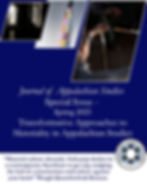Journal of Appalachian Studies
Special Issue:Transformative Approaches to
Materiality in Appalachian Studies

“This issue of JAS to our friend and classmate Tammy Clemons, who never stopped envisioning a new material and environmental future for our mountain communities.”
Jasper Waugh-Quasebarth
Zada Komara

Tammy “Tambone” Clemons
Meet the Special Issue
Co-Editors

Jasper Waugh-Quasebarth
Jasper Waugh-Quasebarth is Director and Curator of the Gordon Art Galleries at Old Dominion University in Norfolk, Virginia. He earned a PhD and MA in Anthropology from the University of Kentucky and a BA in Anthropology and History from the University of Virginia. He has held research, teaching, and administrative positions in Anthropology and Folklore Studies through his work with the Smithsonian Institution’s Asian Cultural History Program, the University of Kentucky Department of Anthropology and Appalachian Center, and The Ohio State University Department of Comparative Studies and Center for Folklore Studies. His research interests involve the entanglement of everyday creative expression with global environmental processes and community-centered collaborative practices. His work has appeared in publications of the Smithsonian Institution, The American Anthropological Association, The American Folklore Society, The University of Illinois Press, The University of Indiana Press, West Virginia University Press, and Cambridge University. His 2023 book Finding the Singing Spruce (West Virginia University Press), which documents the craft of musical instrument making and its intersection with extractive forestry in West Virginia and Romania, was a finalist for the Weatherford Book Award for Best Nonfiction book about Appalachia.

Zada Komara
Dr. Zada Komara is a full-time teaching faculty member as a Senior Lewis Lecturer in the Lewis Honors College, an interdisciplinary unit focused on critical pedagogy, community-building, and experiential education. She holds three degrees in Anthropology and is an archaeologist of the recent past. Her research focuses on public history and archaeology, Appalachian coal towns, contemporary garbology, honors pedagogy, and the relationship between consumption and social identity. She has developed and teaches multiple interdisciplinary social science seminars about Appalachian representation and discourse, materiality and material culture, the social effects of pseudoscience, and ritual, myth, and magic. Dr. Komara’s current projects all privilege student-directed research and include the UKY Slang Collection Project available on UKnowledge abut campus slang and folklore, the Rendville Coal Town Archaeology Project in Ohio’s Appalachian coalfields, and the Rose St. Garage Archaeology project about campus recreation and consumption. She also supervises the Materiality of UKY Oral History Project and the College Life Oral History Project, which collectively total over 500 student-collected interviews and can be accessed at the UKY Louie B. Nunn Center for Oral History. She also administers the UK Appalachian Center's Coal Camp Documentary Project, a collaborative documentation effort focusing on company coal towns in Kentucky's 54 Appalachian counties.
Why This Special Issue
While studying for my doctorate at University of Kentucky, I was incredibly lucky to find myself among an array of talented, brilliant, and passionate scholars of the places we call Appalachia. Among those colleagues, Zada and I shared a common interest in the things that make up our social lives and come to stand for us in so many ways. After many conversations and field trips, our complementary enthusiasm led us to find other researchers and artists who were putting primacy on the material culture and materiality of Appalachia. The Appalachian Studies Association gave us that perfect avenue, as it so often does for folks trying to build across institutions, disciplines, and regions. When we gathered with a larger cohort at conference panels and social get-togethers, we found our enthusiasm resonated with the approaches of our fellow scholars putting things first. We're so grateful for the opportunity to weave a material culture-driven view of Appalachian Studies into its fabric going forward and thankful to all the folks who have made this happen!
-Jasper Waugh-Quasebarth
Appalachia is a region materialized for public consumption. We can all easily list the tropes. The romantic ones like banjos, quilts, and cornbread; the pejorative ones like trailers, teeth, and roadside trash. Things matter. But the focus has too long been on what these things mean about Appalachia at the expense of how things make Appalachia. I was lucky to meet Jasper in grad school, a fellow scholar who is eternally curious about the nuance of materiality, the process of thingification and region-making. We were both lucky to find scholars and activists and community members across the wide swath of Appalachia who were similarly curious and similarly invested in exploring this nuance for regional empowerment. This issue materializes our passion in print and we hope it inspires everyone who reads it to notice how people make things as things simultaneously make people and region.
-Zada Komara





